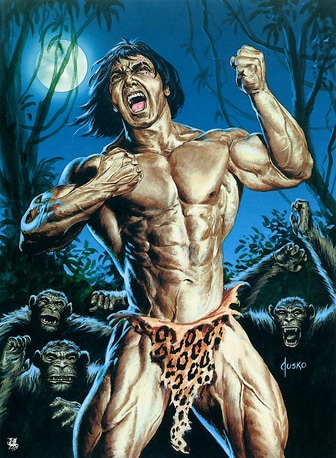 Who defines masculinity in a society? Do men define it or are women contributors as well? Or is it just the most powerful influencers in the culture that set this norm? Do we have specific baseline behaviors that perhaps all societies around the world define what masculinity looks like? Or is it historically defined as an arbitrary set of rules, based on the present day cultural norms? How does Western society base its definition of manliness? Current traditional definitions of masculinity in the U.S. tend to base masculinity on several factors. Many of them centered on physicality (read: physical strength) and acquisition of resources. So for example, a man’s prowess at providing for his family or for himself might set a picture of his masculinity. Still important may be his sexual aggressiveness in finding and selecting a mate. We still see in our cultural dialogue, the depiction of the quintessential male as an emotional isolate, who always remains in the logical, rational mindset, to maintain good decision making in the face of an uncertain world. Of course, there’s dominance in relationships and understood leadership roles in work and social activities. Finally, if you throw in a thought for ambition, pride, honor, and duty, you could pretty much sum up what we in the West would consider our ideal man. How does this compare with other cultures around the world? With current American influence at its greatest, you might think that our masculine definitions would be more accepted around the world. In many ways, masculinity around the world can be seen as an opposite of feminine traits and in fact, that measure was used to create a scale as it were of how masculine values rate around the world. This scale known as the Hofstede Scale ranks countries around the world based on a masculinity ranking; the higher the number the more emphasis in the culture on masculine values versus feminine. Japan ranked as the highest on the masculine scale with a score 95 out of 100. The U.S., surprisingly ranked around the middle of the countries listed, which was a good cross section of nations around the planet. Joining the U.S. in the middle were countries from the Middle East (Egypt, Kuwait, Saudi Arabia, et.al), countries from Africa and surprise – Latin America. At the low end were the egalitarian Scandinavian countries (once home to the warrior Vikings). I suppose Ikea might be credited with that. By using a scale that measures masculine values (aggressiveness vs. passivity, emotional detachment vs. emotional engagement, power vs. cooperation, traditional values vs. open values, etc.) and comparing it to what is considered feminine values, the scale is measuring what essentially is the opposite of feminine. It would stand to reason that that is how we define masculinity against the baseline of what culturally we see as feminine behaviors. As the ratings drop on the Hofstede scale, there is more of a lean towards more androgyny within both sexes and a more egalitarian approach to defining gender roles. Again, in the West, we often see portrayed in novels, film, and advertising, the depiction of the traditional male character as strong and silent, or as a tough guy, or even a great and forceful lover and physically dominant enough to qualify for Alpha Male pay. There is a certain tendency towards homophobia (more on that in a minute) and possessing domain over women. Our Western ideal male also tends to be a winner and often a winner at all costs--personal and interpersonal. The expectations are hammered in our heads as males from childhood to the grave. We never escape this ideal, yet we all know that it is entirely unrealistic to expect all men to live up to this caricature. In fact, living up to most of it is a fast lane to interpersonal issues, mental health problems, substance abuse, and violence. Across history, especially Western history the ideal male role has been depicted as hero, chivalric and even as court dandy, all changing under the cultural shifts over time. With the rise of technology and the increase in leisure time, male roles have changed accordingly. Less work on providing for self and family, more on recreating a new vision for the male, which includes new models, i.e., metrosexuals (see 18th century court dandies), herbivore males an extreme bellwether, which seems to forsake male sexuality altogether and stay at home dads, who take on a lot of the traditional female work from home. Many of our traditional values about masculinity have been intertwined with our religious beliefs as well. In Western culture, the influence of Christianity in a largely patriarchal church that emphasizes the importance of male dominance, including the Godhead can’t be understated. I believe today that many of those who cling to evangelical and fundamentalist views of Christianity are the most threatened by what could best be called the “precariousness of manhood” which is now threatening traditional male role values. With the rise of the feminist movement in the 60s, followed closely by the emergence of a strong and vocal LGBTQ movement in the 70s, traditional males are feeling affronted from many sides. The fact that this country elected a demagogue like Donald Trump as our leader represents the last gasp of this traditional masculine based culture. Surprisingly, many women still support the traditional male value based ethos even if it is not necessarily in their best interest to do so. Fear of change is a powerful motivator. And now, we are beginning to see the emergence of the sensitive male movement, although movement may be a bit premature at this stage. Highly sensitive men are starting to recognize that they are different and for good reason and beginning to find themselves in the complex world of masculinity. The world needs us now, and as psychologist Ted Zeff contends, we can be instrumental in saving this planet from runaway traditional aggressive masculinity. HSMs are now able to, with head up, state that they are a different kind of male. We are no longer accepting labels of gay or effeminate or sissy, but showing strength with a sensitive, nurturing empathetic, cautious, non-aggressive and contemplative nature. All characteristics that even twenty years ago, would have branded them as weak and ineffectual men. And like the feminist movement and the LGBTQ movement, this idea of a different definition for masculinity is another nail in the coffin for traditional manliness. And you can bet there is going to be strong push-back. Now, I don’t expect that traditional value masculinity is going to disappear, maybe ever; however, I think it’s going to have to move over for a wider and deeper definition of what masculinity entails. The world is changing, and as I often mention, evolution favors those that can adapt and change with the environment. The traditional male value systems are going to have to change as well. And as HSMs we can and should be the perfect intermediaries and ambassadors for that change. For many of us, we have lived in both worlds. And as HSPs, we know how to be the bridge. What about the next generation of men, the boys of today? What can we do to shape them, give them guidance on being a man, in a world where the definition of masculinity must and is changing? We should focus on teaching them to be themselves first and to craft a new ideal for masculinity. There is no need to sacrifice strength, but realizing that strength is not just physical strength, but emotional strength as well. Let’s not forget men still have a sexual role to play, but interpersonal relationships don’t have to be based on aggressiveness or dominance. We can be leaders without sacrificing compassion; we can be active without forsaking contemplation. And yes, we can still be rough and tumble, get dirty, climb trees, be adventurous and at times androgynous, without losing our sight of the new masculinity. There is much to learn here for boys and men, and for that matter women who influence us so much. Here are some ideas on raising our boys, both HSP and non-HSP boys:
Footnote: A rather attractive grandmother came by the house recently to pick up a chair she had purchased from us. Her husband, a tall, quiet man was with her as was her three year old grandson. I remarked about how sharp the little boy’s cowboy boots looked. The grandmother proudly reached out for her grandson to gather his attention and she said to the boy, “that’s why we won’t to be a cowboy, isn’t?” the little boy shuffled around with his head down. The grandmother repeats to him, “and we want to be a cowboy because cowboys don’t cry, right?” the little boy thought a moment then silently shook his head in acquiescence. Grandmother was a traditionalist and just did more harm than good for this child. It was not her intent to harm, but the firmness with which she stated emphasized the ideal that men don’t cry. Shame. But, it’s the Texas way. I didn’t bother to ask her if she saw Brokeback Mountain. Seems that cowboys do cry. Thanks for stopping by, until next week… References: https://en.wikipedia.org/wiki/Masculinity https://www.andrews.edu/~tidwell/bsad560/HofstedeMasculinity.html http://www.clearlycultural.com/geert-hofstede-cultural-dimensions/masculinity/ http://www.apa.org/monitor/2012/06/masculinity.aspx http://www.artofmanliness.com/2008/06/08/7-vital-characteristics-of-a-man/ https://www.psychologytoday.com/blog/life-in-the-intersection/201703/what-is-healthy-masculinity https://www.psychologytoday.com/blog/the-race-good-health/201610/why-do-we-tell-boys-man http://drtedzeff.com/news/sensitive-men-can-save-the-planet.php https://www.psychologytoday.com/blog/our-gender-ourselves/201205/boys-men-raising-independent-open-minded-sons
1 Comment
Leave a Reply. |
AuthorBill Allen currently lives in Bend, Oregon. He is a certified hypnotist and brain training coach at BrainPilots.com. He believes that male sensitivity is not so rare, but it can be confounding for most males living in a culture of masculine insensitivity which teaches boys and men to disconnect from their feelings and emotions. His intent is to use this blog to chronicle his personal journey and share with others. Archives
July 2024
Categories
All
|


 RSS Feed
RSS Feed
